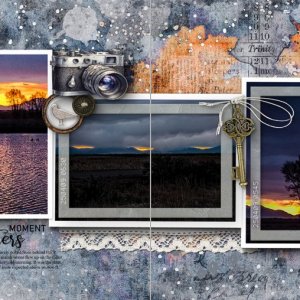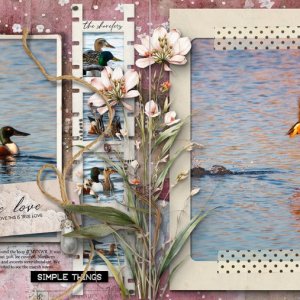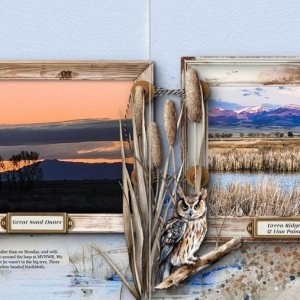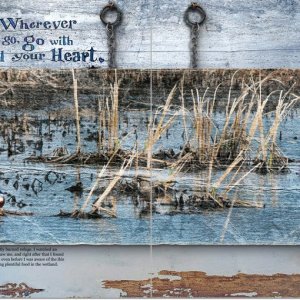Oscraps
Search results
-

Fleischman Fabrics
We'd take the subway from 32nd street to Center City, and walk the rest of the way to the shops in the old Garment District. They sold all kinds of imported and antique lace from all over the world. We'd have class assignments and after each trip would have to write about our trips.- isDK
- Media item
- Comments: 4
- Category: Joyful Heart Designs
-

June Challenge #6 - Journaling
Thanks for the challenge, Rae. I talk about my passion on every page, so this was easy for me. :p I have two, really- wildlife and what computers can do to help in my creative expression.- isDK
- Post #2
- Forum: JUNE 2024 MONTHLY CHALLENGES
-

#6 Notice
AI image software creates composites of many people to produce images that express feelings without invading our privacy. This makes it possible for watercolor artists to add a whole new emotion to their work. I finally decided to try adding some of Jen's images of women to my pages.- isDK
- Media item
- Comments: 4
- Category: Challenge 6
-

JUNE 2024 CHALLENGES TRACKING THREAD
JUNE 2024 Challenge Layouts Links: Challenge 1: Wordart https://oscraps.com/community/media/1-see-the-good-the-heron-and-the-snake.393330/ Challenge 2: Artist Inspiration https://oscraps.com/community/media/2-savor-every-moment.393241/ Challenge 3: Web Inspiration...- isDK
- Post #4
- Forum: Challenge Explanation, Rules, and Tracking
-

Refuge Escape
The sun came over the Sand Dunes about ten minutes after official sunrise, and it colored the snow on the peaks to the west. In May, we could see a little bit of green and the cattails were almost all gone. They had finally burned all of the slash piles that had been sitting for years.- isDK
- Media item
- Comments: 9
- Category: Joyful Heart Designs
-

In the Garden
The copper roses were different every year. Some years there were mostly yellow flowers, and some years more flowers than others. What was big in May was the most red blooms at the same time on one branch that I'd ever seen, and none were yellow. They'd always be in my top 10 favorite.- isDK
- Media item
- Comments: 2
- Category: Digi ARTventures
-

The Worst White-Out Ever
The snow wasn't much when we left the hotel at 4 am, but as we drove east it was driving from the east. We knew the oncoming trucks were doing just fine, but we saw a poorly equipped car roll. I called 9-1-1. It was the worst we'd ever been in, and if we had known we would have waited for daylight.- isDK
- Media item
- Comments: 4
- Category: ViVa Artistry
-

Tribute to Trees of War
In five weeks after the U.S. offered aid to Ukraine, some gains were made,but things moved slowly and Russia kept up daily bombing of apartment buildings near the border. They also mounted the largest disinformation campaign ever. By Memorial Day, I wasn't so sure it was going to be OK.- isDK
- Media item
- Comments: 5
- Category: Joyful Heart Designs
-

Precious 1000
Inspired by Jen's new creased papers, I wanted to see if I could make the photos look like they'd been creased too. :p- isDK
- Media item
- Comments: 9
- Category: Joyful Heart Designs
-

Stack-A-Lackin'
Thousands off blackbirds were rising out of the rushes. Geese and many ducks were copying the behaviors of their mates. The mallards were swimming in a circle, and it looked like they were feeding. I took less than half as many photos as the day before, which was a round one-thousand.- isDK
- Media item
- Comments: 5
- Category: Joyful Heart Designs
-

Contact Sheet 240518
Too much going on to give these photos the love they deserve, so I made a contact sheet using Photoshop's native script. It's a good way to get things done, so I had time to play with the page before saving in my daily notebook.- isDK
- Media item
- Comments: 6
- Category: Joyful Heart Designs
-

Northern Lights
I'd seen a better showing of The Northern Lights from our house before, but many other times when they could maybe be a glow from the lights of the City of Fort Collins. The next day, the glow was gone, so I thought my guess was validated. What was big for me was the first lilac bloom.- isDK
- Media item
- Comments: 7
- Category: Joyful Heart Designs
-

Agrippina (ATC)
Inspired by Jen's HAPSFreebie and her newest papers. Wordart with Agrippina's name was embedded in the paper.- isDK
- Media item
- Comments: 3
- Category: Joyful Heart Designs
-

May 9 Photos in a Box
At our last stop, there was lots of action and we could have stayed and watched longer, but we weren't sure our photos would be good and we were tired and cold. We never did figure out what they were doing, but we were pretty sure it was a lot of aggressive behavior.- isDK
- Media item
- Comments: 11
- Category: Joyful Heart Designs
-

Avocet Island
At our last stop at the south end of the refuge, the avocets were much closer to our shore than usual, and they were feeding in pairs. There were a lot of sweet moments, and we were lucky to get a lovely close-up view just after sunrise. They helped us see the very shallow water level.- isDK
- Media item
- Comments: 5
- Category: Joyful Heart Designs
-

Every Moment Matters
On Thursday, our last day, the sum barely poked from behind thick clouds after some red at dawn. A few marsh wrens flew up on the taller reeds but didn't stay long it was another cold morning. It was the start of a mostly gray day, 6 to 12 inches of snow expected above 10,000 ft.- isDK
- Media item
- Comments: 3
- Category: Palvinka Designs
-

True Love (Shovelers)
On Wednesday again only one trip around the loop at MVNWR. It was 30ºF and windy. The big lake was about 50% ice covered. Northern shovelers, ruddy ducks, Canada geese and avocets were abundant. We watched love fests at each stop, and waited to see the marsh wrens.- isDK
- Media item
- Comments: 5
- Category: Natali Design
-

Great Sand Dunes & Green Ridge
On Tuesday it was 28ºF and even windier than on Monday, and with fewer birds, we opted for only one trip around the loop at MVNWR. We looked for the owl at our first stop, but he wasn't in the big tree. There were plenty of both red-winged and yellow headed blackbirds.- isDK
- Media item
- Comments: 7
- Category: Daydream Designs
-

May Challenge #2 - Creative Photo Treatments
Thanks for the challenge, Ona! I used Joyful Heart's basic gray paper from ColorCrush72.- isDK
- Post #19
- Forum: MAY 2024 MONTHLY CHALLENGES
-

#2 Go with All Your Heart
There was plenty of life on the recently burned refuge. I watched an otter dive under the water when he saw me, and right after that I found a northern shoveler and an ibis. And even before I was aware of the ibis I had a photo of both of them enjoying plentiful food in the wetland.- isDK
- Media item
- Comments: 5
- Category: Challenge 2
